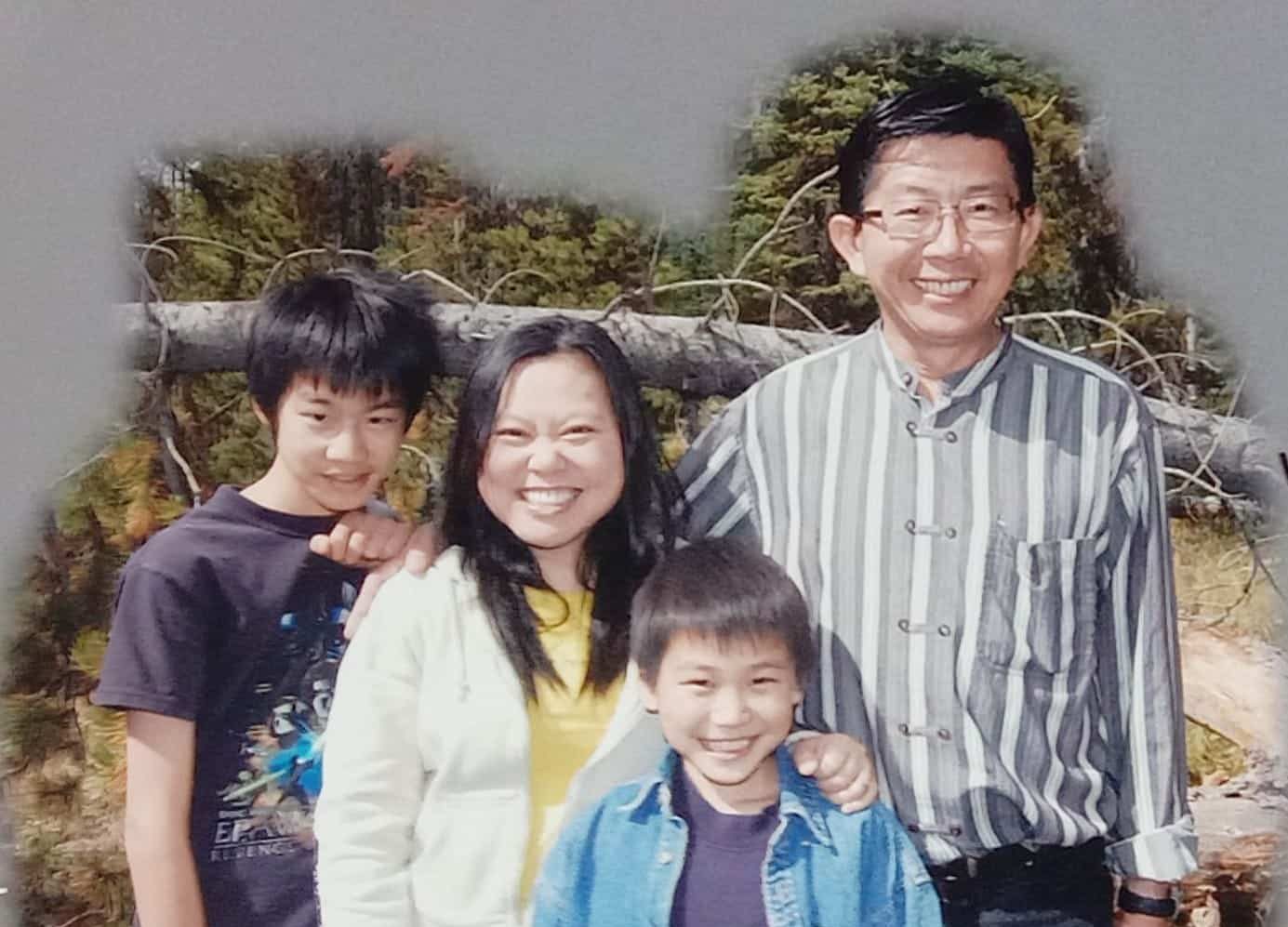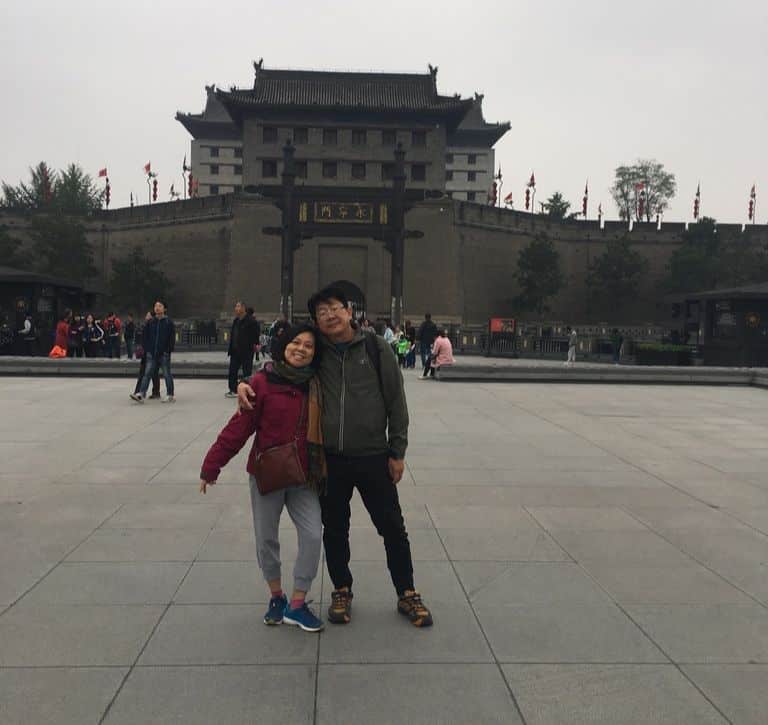“In tears, I told God I had failed. He replied, ‘I am the perfect Father and I, too, have prodigal children.'”
by Christine Leow // February 29, 2024, 7:15 pm

"I thought I had given my children the best," said Chua Chiew Peng, an ex-pastor whose husband, Jabez Tan, is a retired pastor. But both their sons became addicted to drugs while the family was living in Vancouver, where Jabez was in theological college. All photos courtesy of Chua Chiew Peng.
Chua Chiew Peng recalls a night when, wrought with despair, she drove to a deserted parking lot in the dead of the night and wailed in her car.
“That was the hardest, most lonely time for me.”
“That was the hardest part, hearing my mother crying.”
Chiew Peng’s family of four – her husband Jabez Tan, their two sons and herself – were living in Vancouver, Canada, and both boys, then only 16 and 14, were using drugs. The younger one was dealing as well and police would frequently show up at their house to search the place or investigate his gang connections.
The family had moved in 2004 because Jabez, then a pastor in Singapore, had wanted to earn a Master in Theology at Regent College. He ended up pastoring a church in Vancouver instead and the family stayed on.
The night that Chiew Peng gave vent to her grief in her car, she had overheard her mother crying in her room. The older woman had come for a visit and had discovered that her grandsons had been addicted to drugs for about two years. Until then, Chiew Peng had kept everyone back home in the dark.
“She was shocked. That was the hardest part, hearing my mother crying,” said Chiew Peng, 55.
There would be more pain and heartache to come.
The early years
Chiew Peng met her husband in Bible college. She was 24 and he was 33.
“He tricked me; he looked a lot younger,” she said in jest.
By then, his past that had involved gangs, drugs and prison was well behind him. When the couple got married in 1992, Jabez was pastoring a local church. In time, Chiew Peng joined him as a pastor.
Then the children came along. The older one was quiet, and enjoyed reading and being immersed in the world of imagination. The younger one was active and “very much in your face”. He loved all sorts of animals and insects.

Chiew Peng’s sons moved to Canada with her and her husband when they were still in primary school.
Chiew Peng home-schooled them for a season when she discovered that her older son was not paying attention in school nor keeping up with his homework, although he still managed to be among the top in his class.
This went on for nearly three years. All the while, Chiew Peng continued working in her church, albeit part-time.
Those were good years. Both boys enjoyed the relaxed pace of home-schooling and thrived.
The discovery
Then came the move to Vancouver. The children were seven and nine at the time. Chiew Peng stayed home to care for them.
About two years in, she found a job as a pastor of a church. Now Jabez was pastoring one church while Chiew Peng was pastoring another. Both parents took great pains not to put undue pressure on the boys to “behave in a certain way”.

Chiew Peng (front row, fourth from left) with the community at Basel Hakka Lutheran Church, which she pastored.
“But they told me it was still hard for them,” said Chiew Peng. “When they asked questions in Sunday School, the teacher would say, ‘Go home and ask your parents.’ They felt dismissed.
“When they misbehaved, they were told, ‘You shouldn’t behave this way. Your mum is a pastor.’ Just by being born, their lives were up for scrutiny.”
As both sons entered their mid-teens, Chiew Peng and her husband noticed a drastic change in their behaviour. First, they found out that both boys were smoking.
Both parents took great pains not to put undue pressure on the boys to “behave in a certain way”.
“I asked them, ‘What do you know about smoking?’ They could tell me all the bad things about smoking. So I asked them, ‘Then why?’
“They said, ‘It’s my choice.’ Those were very difficult conversations we had.”
Within months, they discovered worse. The boys had moved on to marijuana.
“We had lots of talks about it. We were quite close. But it was tough for them because everyone around them was doing it.”
Then came more behavioural changes. The boys became rude, even aggressive. They stayed up till all hours of the night. One got caught smoking a joint at the back of the school and the Tans had to be called in to have a talk with the teachers.
After that, it was not much of stretch for them to get into hard drugs. Her younger son, always the extrovert, even became a drug dealer.
“I had lots of fights with them about it. Lots of arguments and tension with them,” recalled Chiew Peng.
The division
When Chiew Peng found a bag of marijuana in her younger son’s room, she flushed the bag down the toilet. Jabez, who had himself battled similar demons, worried about how their son would answer to the gang.
While Chiew Peng wondered if all this could have been avoided had they not gone to Canada, Jabez was thankful it did not happen in Singapore. With drug laws in the country so strict, he thought their sons could have ended up in prison like he had.
Their different approaches to the children’s drug problem became a source of friction for the couple.

Chiew Peng and Jabez struggled to agree on how to deal with their sons’ addictions.
“One of the big contentions was whether to go back to Singapore. We had a lot of arguments about that.”
Drugs also divided the family in other ways.
“The boys were close when they were young. But drugs destroyed their relationship and their trust in each other.
“It took a toll on my faith. How could I continue as a pastor? I told the Lord, ‘I’m disqualified.’”
“When drugs are involved, money is involved. You want to get the drugs, you lie and there are fights over it,” explained Chiew Peng.
Quite naturally, the discord without created turmoil within.
“It took a toll on my faith. I wanted to leave the ministry. How could I continue as a pastor? All those verses about a leader managing his household. I told the Lord, ‘I’m disqualified.’
“There was also a lot of guilt. Did I do something wrong? Did I not do enough?”
While Chiew Peng lamented loudly and often to God, she did not blame Him.
“I did say once, ‘I serve You, I did all these right things. Yet this happened. No wonder you have so few fans and so few friends.’
“But then I started laughing. I don’t think we served God thinking life would be easy. Who knows, maybe my life would be even more unbearable without God?”
The struggle
For more than two years, Chiew Peng and Jabez vacillated between hope and disappointment as their sons tried to quit drugs only to relapse again and again.
“My husband was a bit more understanding. He would try to get them to go to school. He was more hopeful that they would come out of it. I was not.
“I was a bit more confrontational. Once they were on hard drugs, they were not listening, they were not even in their right mind. Each time I looked at them, I would start crying. There was a lot of pain and sadness.”
“God said, ‘Your calling came before you even had your kids. You do not become disqualified because of them.'”
Offers to pay for rehabilitation, amounting to a few thousand dollars, were flatly refused.
Everything seemed dismal, but God was not distant. After a particularly bitter fallout with her older son, God assured Chiew Peng that He would “restore my sons to me in the right mind”.
“So I hung on to it, got disappointed, hung on, disappointed.
“I didn’t come from a good family. I thought I had given my children the best. So there was a lot of grief and questions as to what went wrong.
“I thought I had lost my children. When would my prodigals return? It was a very lonely path.”
Chiew Peng turned to solitude and journalling. Mulling over the words of a friend who warned her that she was “letting experience dictate her theology”, she also studied the Bible more.
“I wanted to quit being a pastor so many times. But God said, ‘Your calling came before you even had your kids. You do not become disqualified because of them.
“I also told God I had failed as a mother. God said, ‘I am the perfect Father and I still have many prodigals, including you.’”
That sobered Chiew Peng up.
The homecoming
But Chiew Peng realised that all this had taken a toll on her. She decided to return to Singapore to rest. It was then that she felt God finally giving her the permission to resign from her job.
“During my devotions, a strong voice came, ‘It is time to tender your resignation.’”
“There was a lot of pain. There was also a lot of surrender.”
While she was in Singapore, her older son unexpectedly asked to return to Singapore, too. Their home in Canada had been broken into because of a drug-related situation. Gangs were involved and her son no longer felt safe there.
Jabez decided to return home with their son. He had been in church when he received a verse from God: “I will say to the north, Give up, and to the south, Do not withhold; bring My sons from afar and My daughters from the end of the earth, everyone who is called by My name, whom I created for My glory, whom I formed and made.” (Isaiah 43:6-7)
He felt it was a call for him to bring his son back.
Unknown to him, Chiew Peng also received the same verse in Singapore to “bring my sons from afar”. It was confirmation that the homecoming was a God-led decision.
There was a snag, though. Their younger son refused to leave Canada. He was only 17 and had dropped out of school.
“It was really tough. He was very upset with us. He felt like we were abandoning him.
“We told him, ‘The ticket is always there for you to come back.’ It was very heartbreaking that he chose to stay back.”
After that, he refused to keep in contact with his family. He did post a message on Facebook.
Recalled Chiew Peng: “He said, ‘I just wanted to let you know I am not coming back. I would rather go hungry and homeless. I don’t know if or when I will talk to you again. Good-bye mum. I love you and I’m sorry.’
“The note inside said, ‘In a very short time, you will consider a big move.’”
“This was when I felt the pain really cut right into my heart.”
Jabez told Chiew Peng to prepare for the worst – they could possibly lose their younger son to an overdose.
“I remember it was in the middle of the night. I went for a very, very long walk, crying and bawling. There was a lot of pain. There was also a lot of surrender.”
So it came as a surprise when, within a month of that message, their younger son asked to return home to Singapore.
“He had a whole encounter with the Lord on his own,” said Chiew Peng.
While in Canada, a childhood friend had taken her younger son to a Chinese restaurant to cheer him up since he was struggling without his family and missing them. The meal came with a fortune cookie.
“The note inside said, ‘In a very short time, you will consider a big move.’”
Her son put the paper in his pocket and gave it no further thought.
Months passed. Then, at a meeting with his probation officer, the man encouraged her son to go home to Singapore. After that meeting, hHer son happened to reach into his pocket to find the fortune cookie message.
“Everything clicked for him,” said Chiew Peng in wonder.
The return
Though reunited in Singapore, their struggle with drugs continued. Within months of their return, both boys were doing drugs again.
By then, Jabez and Chiew Peng were determined to present a united front. They told their sons that their home was a drug-free zone. If they were doing drugs, they had to leave. Husband and wife also had prayer walks daily to intercede for their children.
“There was one stage when, together with my husband, we would do the action of lifting our sons to the altar, saying, ‘Lord, we put them on the altar.’”
During one such walk, Jabez suggested that they send their boys to a halfway house. Because both parents were now equally firm, their sons relented. One went to The Hiding Place and the other to The New Charis Mission and later to The Hiding Place.
“My prayers will outlast and outlive me.”
Their younger son lived at the halfway house for two years. He completed his ‘O’ level exams there and obtained stellar results. Upon completing the rehabilitation programme, he enrolled at a polytechnic to study Mass Communication. He is now 26 years old and works in a friend’s dog-walking business.
Their older son took a longer route to recovery which included time at the Drug Rehabilitation Centre (DRC). Now 28, he works in construction and has been clean for a year.
Over more than a decade, and through countless hopeful recoveries and heartbreaking relapses, Chiew Peng has learnt to continually surrender.
“When I feel a bit jaded with the back and forth, I would tell God, ‘Lord, it’s not that I don’t believe in You or my faith in You is wavering; I don’t believe in my children.’ But I believe in prayer.
“The Lord has met me so many times in prayer. The kind of assurance when everything is still so mad, you find some peace and some sanity in the midst of it all in prayer.
“My prayers will outlast and outlive me. But God will outlast them and outlive me. I leave them in His good hands.”
The rewards
While Chiew Peng would not wish this scenario on anyone, she told Salt&Light she has gained much from her experience. There were precious lessons that would not have been learnt otherwise.
“I began to know the Father’s love and how God loves us from a broken heart, pursues us, never gives up.”
“When Paul says that he wanted to know the fellowship of Jesus’ sufferings (Philippians 3:10-12), I understand. Suffering, in some way, is one of the best avenues to know God.
“Through this, I began to know the Father’s love and how God loves us from a broken heart, pursues us, never gives up.”
She also developed an interest in counselling. After earning a Master in Counselling, she now has her own counselling practice Greater Than Two: Counselling and Therapy.
“When I was in my first year of studying counselling, God impressed upon me this name. When I am in counselling with my client, I am with Someone greater. There are more than two. Counselling is God’s way of healing people, too.”
The fissure in her relationship with her children has since been healed.
“Our relationship has been so tested. Now it is very strong. At this age, they still come and kiss and hug me.
“My children say, ‘Mum, I know that you love us.’ They know that, even at their worst, they will never be abandoned by their parents. They know they always have a safe haven to come back to.
“That is the assurance – that they know the heart of God because they can see it in the heart of their parents.”
RELATED STORIES:
Love them, just love them: The missionary couple who prayed their prodigal children home
We are an independent, non-profit organisation that relies on the generosity of our readers, such as yourself, to continue serving the kingdom. Every dollar donated goes directly back into our editorial coverage.
Would you consider partnering with us in our kingdom work by supporting us financially, either as a one-off donation, or a recurring pledge?
Support Salt&Light


